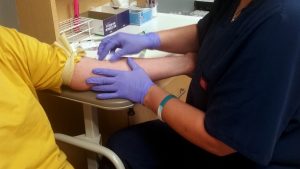Fungal infections, also known as tinea or dermatophyte infections, are a common problem seen in a dermatology practice. Tinea commonly affects the feet, groin, body, scalp and nails. Although many cases of tinea are treated with topical anti-fungals, tinea infection of hair-bearing areas or of nails require oral anti-fungals. In adults, this is commonly terbinafine, while in children this is often griseofulvin.
Do anti-fungal medications require lab monitoring?
 It has been common practice to perform base-line lab tests, especially liver function tests (LFTs), prior to starting a course of these anti-fungals, and subsequent monitoring during the course of treatment, based on the observation of rare and idiopathic severe drug-induced liver injury. The utility of this practice has long been questioned. A recent retrospective analysis of nearly 5,000 patients taking a course of terbinafine (often known by its trade name Lamisil) or griseofulvin concluded that routing lab monitoring is not necessary or helpful
It has been common practice to perform base-line lab tests, especially liver function tests (LFTs), prior to starting a course of these anti-fungals, and subsequent monitoring during the course of treatment, based on the observation of rare and idiopathic severe drug-induced liver injury. The utility of this practice has long been questioned. A recent retrospective analysis of nearly 5,000 patients taking a course of terbinafine (often known by its trade name Lamisil) or griseofulvin concluded that routing lab monitoring is not necessary or helpful
In this analysis the rate of baseline lab abnormalities detected in patient taking terbinafine was low, with approximately 3.6% having elevated liver enzymes, 5% with baseline anemia, 1.8% with low neutrophils, and 5% with low lymphocytes.
Monitoring laboratory test during the course of terbinafine showed only four cases of grade 2 or higher ALT liver enzyme measurement elevations (0.2%) and one case of grade 2 or higher AST measurement elevation (0.1%). There was a single case of grade 2 or higher anemia (0.1%), and five cases of grade 2 or higher lymphopenia (0.7%). One patient was diagnosed with terbinafine-induced hepatotoxicity, after exhibiting grade 3 ALT and AST measurement elevation. Overall, only six patients discontinued use of terbinafine because of liver function test abnormalities.
Similarly for griseofulvin, either microsize or ultramicrosize, the rate of baseline and monitoring laboratory test result abnormalities was low, with no clinically actionable laboratory test results or need to discontinue the medication due to results on routing lab monitoring.
Routing lab monitoring of terbinafine and griseofulvin is not warranted. This is not to say that there is no risk of drug-induced adverse events, only that routine lab monitoring will not detect or prevent the very rare case of idiopathic fulminant liver failure.
Many patients are hesitant to take oral anti-fungal medications to treat their tinea infections because they are concerned about possible side-effects or heard that terbinafine can cause liver damage, or are deterred by the need for blood tests. As a result they opt for topical treatments that are likely to have lower cure rates, such as topical nail lacquers. There have been other studies before this one that also concluded that routine lab monitoring was not necessary, but this report gives further confidence to both physician and patient that oral anti-fungal medications terbinafine and griseofulvin can be safely used without routine lab test monitoring.
It is still prudent to perform a baseline liver function test to screen for any underlying liver function abnormalities and avoid these medications in patients with significant preexisting LFT abnormalities.
Patients should be seen at regular intervals while they are on these medications for a review of systems and focused physical exam to detect signs and symptoms of liver toxicity or other adverse events.
Contact SOMA Skin & Laser to treat a fungal infection today. 973-763-7546

